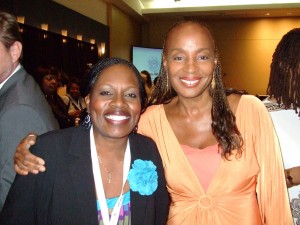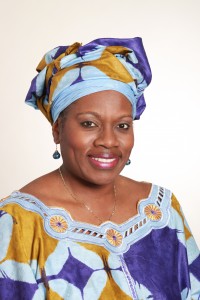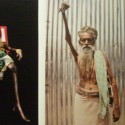Q&A with Sarah Onyango
By Samuel Getachew
Ottawa-based Sarah Onyango’s favourite quote is Mahatma Gandhi’s, “You must be the change you want to see in the world”. In deeds and words, she is a reflection of this famous quote as well as being a great advocate for her community.
Onyango reflects with Sway about what Obama’s success has meant for her, the current state of Ottawa’s black community, and pays tribute to the elders in the community.
SG : You have used the power of the media to tell everyday black stories for many years. You have been involved with CHUO 89.1 FM campus community radio, Rogers TV and Ottawa’s The Spectrum for a very long time in addition to creating your online “community hub” BlackOttawa411. Please share with us your experience so far.
Sarah: In my 15 years or so of involvement with community media, I am pleased to see how much of an impact I have been able to make in terms of helping increase the visibility of our black success stories in the mainstream.
I have been very lucky to have so many elements of this black community entrust me with their stories, encourage and support me in such a steadfast manner. I’m glad to have been able to use my media access and influence to help “build community” by connecting groups and people who otherwise would be operating in silos, completely oblivious to each other’s existence.
SG: Your favourite quote is Mahatma Gandhi’s “You must be the change you want to see in the world.” Please explain.
Sarah: Yes, and you should add “Actions speak louder than words.” In our black community, many of us bemoan our lack of advancement in “Mainstream Canada”, our lack of economic clout, the way our achievements and those of other blacks are overlooked or minimised, the over-representation of our men in prisons, etc.
Do the same number of complainers actually take concrete action to improve our lot and that of our fellow blacks? What made me decide to work in community media was the fact that I wanted to be a part of the solution. So I set about seeking opportunities to do that.
SG : You have been a resident of Ottawa-Gatineau for a very long time. You have observed the state of the black community through your many roles including as a activist and a community builder. What are some of the positive changes you have been observing recently?
Sarah: I like the energy and enthusiasm of our young black people, that “can do” attitude that seems to be spreading. An increasing number of them are present in our universities and colleges and there seems to be a new generation of black leaders emerging. Technology has helped these young people network and organize, in ways unheard of even in my day. And the mainstream media have taken notice. In our local papers and TV news programs you hear more of those “good news” stories than you did even a decade ago.
I’m also pleased that the divide between continental Africans and Caribbeans that may have been more prevalent in the previous generations seems to be lessening tremendously with this new, more open-minded generation of blacks.
SG: As a Kenyan-born Canadian, you must have been proud of Barack Obama’s success in the United States. Do you think that might be possible in Canada, a country that prides itself on being an open and progressive society?

Sarah with Susan L.Taylor, former editor-in-chief of Essence magazine at the 2010 Congressional Black Caucus Legislative Convention in Washington, DC.
Sarah: Well how can a Kenyan not be proud of President Obama’s astounding political career and his worldwide impact?! His campaign and subsequent election galvanized our black community back here and motivated many of us to take a greater interest in civic engagement and politics. However, I’m not convinced [black Canadians]would be that passionate about a black Prime Minister of Canada at this point.
Unlike the United States, we do not have that critical mass of “indigenous” Canadian blacks that would greatly facilitate political mobilization on a massive national scale. Black Canada is a product of numerous waves of immigration, under many different circumstances. Then you throw in the cultural, linguistic and religious diversity and the whole “mosaic” versus “melting pot model of integration, and you get an idea of the complex setup we’re dealing with.
I think that our community leaders, churches, community organizations etc. need to do a better job of promoting “active citizenship” in our black community and work together to help us become a more informed and engaged black electorate.
SG : What are some of the projects you are involved in?
Sarah: I volunteer for Black History Ottawa, promoting our Canadian black history and the contribution of blacks to Canada’s development. I am also a member of the Black Women’s Civic Engagement network, which shines a spotlight on black women’s contributions to political and civic life in Canada. I unofficially support many other programs and groups focused on empowering our black youth and New Canadians, including OCISO, the Black Canadian Scholarship Fund, Jaku Konbit. I also volunteer with the United Way as a presenter of the Community Builder Awards.
SG: Any parting words?
Sarah: To our elders: our young people need you, your mentorship, encouragement, and especially your stories of how you have built your lives in Canada. Why should they look only to remote figures in books and archival footage for inspiration when you are right there to inspire them in person?
Young people: your elders are an infinitely valuable source of useful information and inspiration You have much to gain from their lives. I encourage you to take the time to document their stories using all that fancy technology we now have so that they can be include in the larger Canadian story.
Lastly, it’s time to stop hyphenating ourselves and segregating ourselves even within our own black community by nationality of origin. Many of us have been in Canada for decades. We have built families, homes and businesses here. Canada can’t just be a “second passport” or a convenient address. We are here to stay and we must claim our Canadian identity fully (when we’ve figured out what that is!).
Yes, I am a proud Maple-leaf-waving patriotic Canadian of Kenyan ancestry. This country has provided opportunities I could only dream of “back home” and I intend to “give back” for as long as I’m able.








Leave your response!